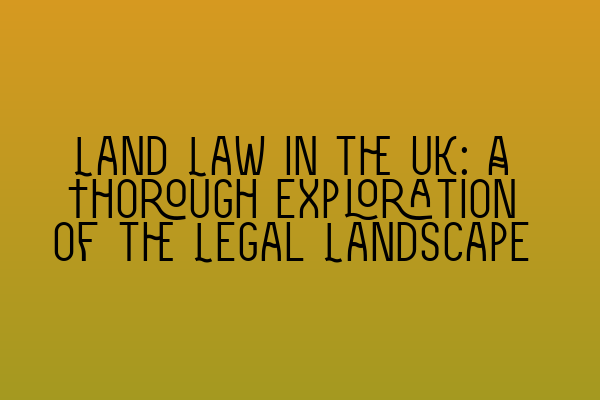Land Law in the UK: A Thorough Exploration of the Legal Landscape
Welcome to the SQE Property Law & Land Law blog, where we delve deep into the fascinating world of land law in the UK. In this comprehensive guide, we will provide you with an overview of the legal landscape, exploring the key concepts, principles, and cases that shape this area of law.
Understanding Land Law
Land law encompasses the rules and regulations governing the ownership, use, and transfer of land and any interests in it. It seeks to define and protect property rights, ensuring that individuals and entities have clear and enforceable entitlements to the land they own or have an interest in.
In the UK, land law is primarily derived from common law principles, statutes, and case law interpretations. It is essential for property owners, tenants, conveyancers, and legal professionals to have a thorough understanding of these legal principles to ensure compliance and protect their rights.
Key Concepts in Land Law
There are several key concepts that form the foundation of land law in the UK:
- Legal Ownership: Legal ownership refers to the full and absolute ownership of land, where the owner has the right to possess, use, and dispose of the land as they see fit.
- Equitable Interests: Equitable interests are rights or interests in land recognized by equity, which may arise from trusts, mortgages, or other proprietary instruments.
- Registered vs. Unregistered Land: The land in the UK can either be registered or unregistered with the Land Registry. Registered land provides a more secure and conclusive proof of ownership, while unregistered land relies on historical documents and deeds.
- Co-Ownership: Co-ownership refers to the joint ownership of land by two or more individuals, with various forms such as joint tenancies and tenancies in common.
- Leases and Tenancies: Leases and tenancies establish the rights and responsibilities of tenants in relation to the land they occupy. These arrangements can be short-term or long-term, providing security of tenure for individuals and businesses.
Important Land Law Cases:
Throughout the history of land law in the UK, several landmark cases have shaped and clarified legal principles. Some notable cases include:
- Pyer v Carter: This case established the doctrine of proprietary estoppel, which protects individuals who have relied on promises or assurances made by another person regarding land.
- Stack v Dowden: The Stack v Dowden case clarified the principles of beneficial interests and co-ownership, particularly in cases where couples or joint owners separate.
- Bolton v Stone: This case highlighted the liability of landowners for injuries caused by dangerous premises. It established the principle that landowners owe a duty of care to those lawfully on their land.
- Street v Mountford: Street v Mountford is a significant case in relation to the distinction between leases and licenses, providing clarity on the legal categorization of occupancy rights.
These are just a few examples of the many cases that have shaped land law in the UK. Understanding these key cases can provide valuable insights into the legal principles and their application in real-world scenarios.
Stay Informed with SQE Property Law & Land Law
At SQE Property Law & Land Law, we are committed to providing valuable resources and insights to legal professionals, students, and anyone with an interest in land law. Be sure to check out our related articles for further reading:
- Interactive SQE Mock Tests for Contract Law: Test Your Knowledge
- Join Our SQE Contract Law Webinars: Expert Insights and Guidance
- Contract Law Reforms: An Analysis of Recent Changes
- Parties in a Contract: Rights and Responsibilities
- The Importance of Ethics in Contract Law: A Comprehensive Guide
With a firm understanding of land law in the UK, individuals and legal professionals can navigate property transactions, resolve disputes, and protect their rights effectively. Stay tuned for more informative content from SQE Property Law & Land Law as we continue to explore the complex and ever-evolving realm of land law.
